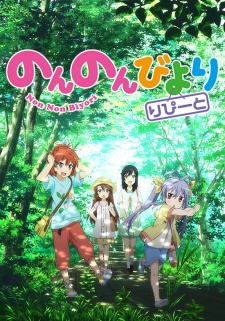
The choice to make a sequel of the relaxing countryside anime Non Non Biyori makes sense given its popularity, but living up to the title “Repeat” we actually start right back at the beginning of the story. Because the work is a slice of life with no key events to signal any sort of progress, we are given no indication as to whether Repeat is an alternate series of events from the first season, or if it is simply showing different scenes from the same timeline. Regardless, there is a fresh new feel this time around, similar enough to before that the difference may just be an increasing in the quality of the writing or the animation, but it made this time around more comical and more relaxing.
This time, we start the show not with the new transfer student Hotaru, but with the current village kids preparing for a new school year. The adorable Renge gets a new backpack to celebrate entering first grade, her sister Hikage leaves for Tokyo, and the sisters Natsumi and Komari guide Renge through the school’s entrance ceremony, consisting of only the three of them (and the nameless silent background figure, the only male in the whole series). Thus the feeling when Hotaru comes in the second episode is that she is an outsider, whereas before she was simply the new addition to the group. Her dynamic with the group throughout the series seems to be much less homogenous this time, as she gets over her fear of heights, learns about various animals, and impresses them with her superior maturity despite only being in fifth grade, the second youngest after Renge. She never feels unwelcome, but it gives a more genuine feeling of transitioning to the country life without ever dominating the screen.
Renge is still the comical lynchpin of the show, with her overblown innocent reactions, boundless enthusiasm and energy, and desire to grow up to join her much older friends. Having led the series with a celebration of her entering first grade, there is a small thread of her maturation running through the show, as she learns to ride a bike, feels sad when her pet tadpoles die, and spends more time with adults like Natsumi and Komari’s older neighbor and the candy store owner. It is never dramatic, and again it doesn’t dominate the screen or become overbearing and clichéd, but it is a cute genuine expression of wanting to be older, smarter, better than she currently is, and it paints her as a relatable character in addition to her hilarious antics.
Another minor element in the same vein is the interactions between the adults and each other, as well as how they indulge both the kids and their inner youth through playing. Hikage flaunts her cell phone and adventures every time she comes back to visit, but also accompanies Renge in playing with dolls, digging up bamboo shoots, and all other sorts of games. Their older sister Kazuho and the candy store owner speak in a friendly manner, but one that still respects the hierarchy of having been in school together as upper and lower classmen. Their interactions, along with the snapshots of parents talking to one another, grounds both the countryside aspect and the relaxed child’s play focus with actual Japanese mannerisms and politeness; ditto the scenes where Kazuho, acting as their school teacher, has to put aside her friendship for all the girls and assign them homework, tests, and sometimes poor grades. It is the countryside, sure, but Repeat exists in Japan, and not in a fictional utopia in the woods.
But without having to push the issue, it really does seem like a utopia at times. As is common for slice-of-life, when the girls all go out hunting bugs or playing in the river the tensions run high, but their playing is often punctuated by shots of the landscape, set to little background music other than the sounds of the woods, of cicadas and the like. The girls are fascinated by cell phones and pictures of Tokyo Tower, and have to walk for hours or take the bus to reach any destination, but they make their own enjoyment in the wide outdoors. With this, Non Non Biyori Repeat avoids the usual countryside show trope of claiming the superiority of the country to the city, but it passively makes an argument that the country is a place to be enjoyed in its own right. Renge and the other characters have good chemistry that makes for plenty of fun, but as even the high tension moments go at a leisurely pace, it’s hard not to sit back, let go of any stress, and enjoy the relaxing ride.